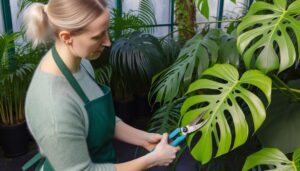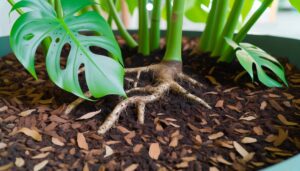Monstera Albo Soil Mix Recipe
To create the ideal soil mix for your Monstera Albo, combine equal parts of orchid bark, perlite, and potting soil. Add horticultural charcoal to improve soil structure and balance the pH to around 5.5-7.0.
Confirm the mixture is well-ventilated to optimize root health and moisture levels. Water thoroughly but infrequently and monitor soil moisture using a hygrometer.
This combination enhances nutrient availability and prevents root decay. Using terra cotta pots with ample drainage holes further increases air circulation.
By following these detailed steps, you'll support your Monstera Albo's thriving growth and health. Explore further for additional insights.
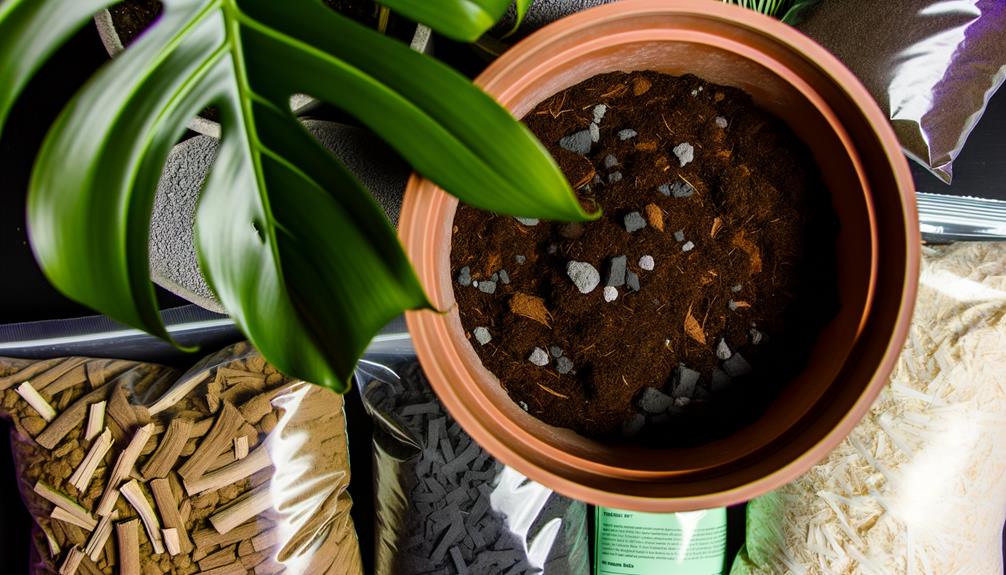
Key Takeaways
- Combine equal parts of orchid bark, perlite, and potting soil.
- Include horticultural charcoal for improved soil structure.
- Opt for a well-ventilated, chunky soil mix.
- Ensure a balanced pH level around 5.5 to 7.0.
- Regularly monitor soil moisture levels with a hygrometer.
Understanding Monstera Albo Needs

To cultivate a flourishing Monstera Albo, you must first understand its specific requirements for light, humidity, and soil composition.
This plant thrives in bright, indirect light. Direct sunlight can scorch its leaves, while insufficient light hinders variegation.
Maintain humidity levels between 60-80%, as Monstera Albo originates from tropical rainforests. You can achieve this using a humidifier or placing a water tray nearby.
For soil composition, opt for a well-ventilated, chunky mix to mimic its natural epiphytic habitat. Combine equal parts of orchid bark, perlite, and high-quality potting soil. This blend ensures peak aeration and moisture retention.
Monitoring these environmental factors closely will set the foundation for robust growth and vibrant foliage in your Monstera Albo.
Importance of Proper Drainage
Proper drainage prevents root decay and other moisture-related issues, maximizing the health and vibrancy of your Monstera Albo.
You should use a well-ventilated soil mix that includes components like perlite, orchid bark, and activated charcoal. These materials improve the soil structure, allowing excess water to escape efficiently, thereby reducing anaerobic conditions that promote pathogenic fungi. Avoid dense, clay-rich soils, as they retain moisture excessively, suffocating the roots.
Ensure each watering is thorough but infrequent, allowing the substrate to dry partially between waterings. This practice encourages a strong root system by replicating the plant's natural tropical habitat.
Consistently monitoring the moisture level with a hygrometer can help you maintain the best balance, maximizing your plant's thriving.
Choosing the Right Pot
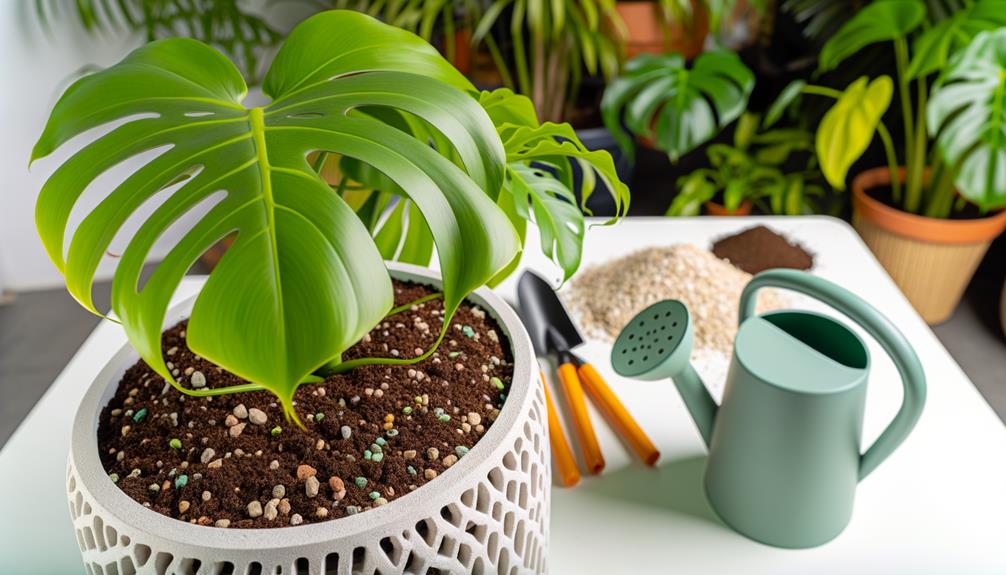
Selecting the right pot is vital for guaranteeing ideal drainage and root health in your Monstera Albo. Opt for a pot with ample drainage holes to prevent waterlogging, which can lead to root rot.
Terra cotta pots are excellent due to their porous nature, enhancing air circulation and moisture evaporation. Make sure the pot size allows for root expansion without being excessively large; a pot that's too big can retain too much moisture.
Consider using a pot with a built-in saucer to catch excess water but avoid standing water at the base. Use a moisture meter to monitor soil conditions accurately.
Regularly inspect the pot for signs of salt buildup, which can harm your plant and necessitate repotting.
Essential Soil Components
Understanding the essential soil components secures your Monstera Albo receives the nutrients and drainage it needs for peak growth.
Begin with a well-aerated base; use high-quality potting mix containing peat moss or coco coir to retain moisture without waterlogging. Add perlite or pumice, which enhances aeration and prevents compaction. Incorporate orchid bark for increased drainage and root aeration.
Ensure your mix has a balanced pH level, ideally around 5.5 to 7.0, to facilitate nutrient uptake. Include horticultural charcoal to improve soil structure and absorb impurities.
Organic Matter Benefits
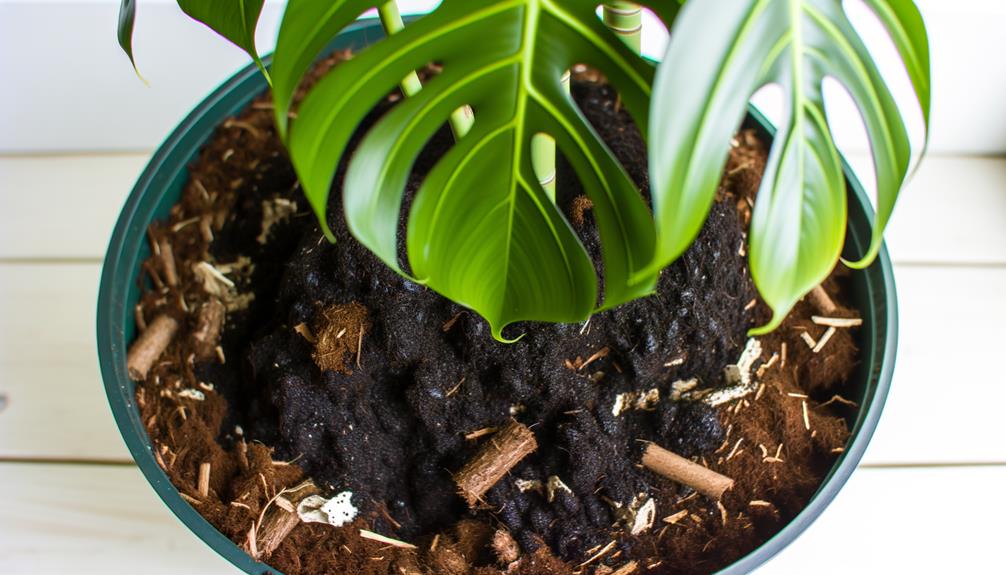
Incorporating organic material into your soil mix enhances nutrient availability, improves moisture retention, and supports beneficial microbial activity.
Organic material, such as compost or well-decomposed leaf mold, releases essential macronutrients and micronutrients gradually, ensuring your Monstera Albo receives a steady supply. It also acts as a sponge, retaining water while maintaining ideal moisture levels, which is vital for root health.
Microbial activity thrives in organic-rich soils, breaking down organic compounds and converting them into plant-available forms. These microbes also produce growth-promoting substances and protect roots from pathogens.
To maximize benefits, mix organic material thoroughly with other components, ensuring even distribution. This balanced approach fosters a robust, thriving environment for your Monstera Albo.
Importance of Aeration
To prioritize the thriving of your Monstera Albo, prioritize aeration in your soil mix. Proper aeration provides the oxygen roots need, prevents root rot, and enhances nutrient uptake.
Use components like perlite or orchid bark to improve air circulation within the soil.
Oxygen Roots Need
Securing your Monstera Albo's roots receive adequate oxygen is crucial for preventing root rot and promoting healthy growth. Proper aeration facilitates gas exchange, allowing roots to absorb oxygen efficiently and expel carbon dioxide.
To achieve the best aeration, you can implement the following strategies:
- Soil Composition: Integrate perlite, orchid bark, and activated charcoal to enhance soil structure.
- Pot Selection: Choose pots with drainage holes to avoid waterlogging.
- Watering Technique: Water thoroughly but allow the soil to slightly dry out between waterings.
- Periodic Soil Loosening: Gently stir the soil surface to maintain its porosity.
These steps will help your Monstera Albo's roots remain well-oxygenated, improving nutrient uptake and overall plant health.
Preventing Root Rot
Preventing root rot in your Monstera Albo hinges on maintaining proper aeration to keep the roots healthy and well-oxygenated.
First, use a well-draining soil mix incorporating perlite, orchid bark, and peat moss to enhance aeration. Perlite's porous structure improves airflow, while orchid bark provides space for roots to breathe. Confirm your pot has drainage holes to prevent water accumulation, which can suffocate roots.
Water your Monstera sparingly, allowing the top inch of soil to dry out between waterings. Overwatering reduces oxygen availability, promoting anaerobic conditions conducive to root rot.
Regularly check the roots for any signs of decay, such as browning or mushiness, and trim affected areas to prevent further spread. Proper aeration is essential for root health.
Improving Nutrient Uptake
Proper aeration in your Monstera Albo's soil mix greatly enhances nutrient uptake by maintaining ideal root oxygen levels, leading to healthier and more vigorous growth. Aerated soil prevents compaction, ensuring that water and nutrients reach the roots efficiently.
Here's how you can improve aeration in your soil mix:
- Perlite Addition: Incorporate 20-30% perlite to keep the soil light and airy.
- Bark Chips: Mix in orchid bark chips for better structure and drainage.
- Coconut Coir: Use coconut coir for moisture retention without compromising aeration.
- Pumice: Add pumice to enhance drainage and prevent soil from becoming waterlogged.
Balancing Moisture Retention
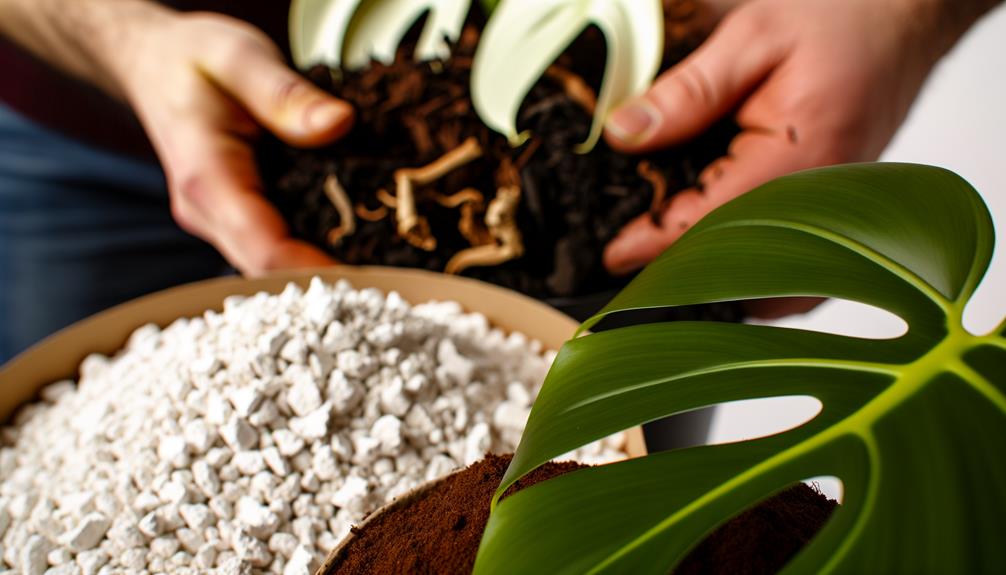
Balancing moisture retention in your Monstera Albo soil mix requires a meticulous combination of components like peat moss, perlite, and orchid bark to promote both aeration and water retention. Peat moss retains moisture well, ensuring your plant's roots stay hydrated. Perlite improves drainage, preventing waterlogging and root rot. Orchid bark enhances aeration, providing the roots with necessary oxygen.
Here's a quick breakdown:
| Component | Function | Ratio |
|---|---|---|
| Peat Moss | Moisture Retention | 40% |
| Perlite | Drainage | 30% |
| Orchid Bark | Aeration | 30% |
Adding Nutrients
To improve your Monstera Albo's growth, you'll need to incorporate organic fertilizer options and employ nutrient boost techniques.
Start by selecting a balanced organic fertilizer rich in essential macro and micronutrients. Additionally, consider supplementing with liquid seaweed or fish emulsion to guarantee a steady supply of crucial nutrients.
Organic Fertilizer Options
For enriching your Monstera Albo's soil, consider using organic fertilizer options like worm castings, compost, and bone meal to provide essential nutrients. These organic fertilizers not only improve soil structure but also promote healthy root development and microbial activity.
- Worm Castings: Rich in nitrogen, they enhance soil aeration and water retention.
- Compost: Provides a balanced nutrient profile, improves soil organic matter, and boosts beneficial microorganisms.
- Bone Meal: High in phosphorus, it supports strong root growth and flowering.
- Fish Emulsion: An excellent source of nitrogen that promotes lush foliage and overall plant vigor.
Nutrient Boost Techniques
Improve the nutrient profile of your Monstera Albo's soil by incorporating slow-release fertilizers and foliar sprays for sustained growth and health.
First, add a balanced slow-release granular fertilizer at the base of the plant during repotting. Choose one with an N-P-K ratio like 10-10-10 to guarantee a steady nutrient supply.
Next, apply a foliar spray every two weeks. Dilute a water-soluble fertilizer to half strength and mist the leaves, ensuring uniform coverage. This method enhances nutrient uptake directly through the foliage.
Lastly, supplement with organic matter. Incorporate compost or worm castings into the top layer of soil.
These steps collectively enhance nutrient availability, promoting robust growth and vibrant foliage in your Monstera Albo.
Mixing the Ingredients
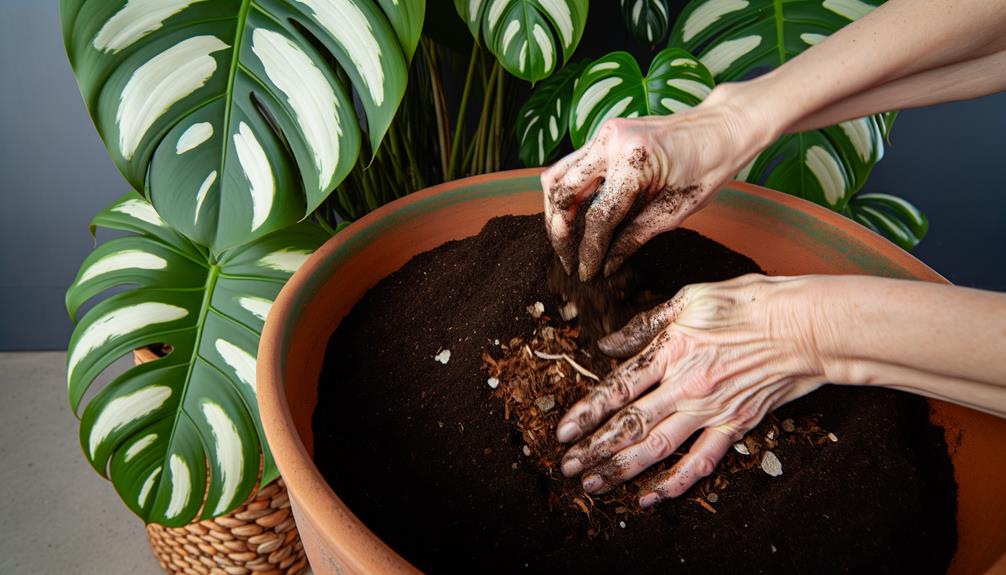
Begin by thoroughly combining equal portions of orchid bark, perlite, and high-quality potting soil in a large container to ensure a uniform distribution of each component. Use a garden trowel to mix well, making sure no lumps form.
Follow these steps:
- Measure Ingredients: Utilize a measuring container for precision.
- Layer Materials: Add each component in tiers to facilitate even blending.
- Blend: Stir the mixture continuously until the consistency is consistent throughout.
- Check Moisture: Add a small amount of water, making certain the mix is slightly damp but not waterlogged.
These precise steps guarantee the soil mix provides adequate aeration, drainage, and nutrient availability for your Monstera Albo's optimal development.
Monitoring Soil Health
To maintain peak soil health for your Monstera Albo, it is important to regularly measure soil moisture levels using a moisture meter. This will help prevent overwatering or underwatering. Conduct periodic nutrient content analysis with a soil test kit to guarantee the soil remains rich in essential nutrients.
Adjust watering schedules and amend the soil with fertilizers based on the data gathered from the tests. This proactive approach will help promote vigorous plant growth and overall plant health.
Soil Moisture Levels
Maintaining ideal soil moisture levels is essential for the health of your Monstera Albo, as improper watering can lead to root rot or nutrient deficiencies.
To achieve the best moisture, follow these steps:
- Use a moisture meter: Insert it into the soil to get an accurate reading. Aim for a moisture level between 4-6 on the meter.
- Check soil manually: Stick your finger 2 inches into the soil. It should feel slightly damp but not soggy.
- Watering schedule: Water when the top 2-3 inches of soil are dry. Overwatering can suffocate roots and promote fungal growth.
- Drainage: Guarantee pots have adequate drainage holes to prevent water from pooling at the bottom, which can cause root decay.
Nutrient Content Analysis
Monitoring soil health involves analyzing nutrient content to make sure your Monstera Albo receives the essential elements for optimal growth. Begin by testing for macronutrients: nitrogen (N), phosphorus (P), and potassium (K).
Utilize a soil test kit or send samples to a laboratory for accurate readings. Assess micronutrients like iron, manganese, and zinc, which are important in smaller quantities. Follow recommended nutrient levels: N (1.5-2%), P (0.1-0.3%), K (1-2%).
Adjust fertilization practices based on results, using slow-release fertilizers or organic amendments to correct deficiencies. Regularly re-test soil every 6-12 months to monitor changes. Proper nutrient management guarantees your Monstera Albo thrives, displaying vigorous growth and vibrant foliage.
Conclusion
By carefully crafting your Monstera Albo's soil mix, you're ensuring its prime growth and health. Why compromise on your plant's well-being when you can provide a balanced, nutrient-rich environment?
With proper drainage, the right pot, and essential soil components, your Monstera will thrive.
Remember to monitor soil health regularly, adjusting the mix as needed to maintain the perfect balance of moisture and nutrients.
Your attention to detail will yield a robust and vibrant Monstera Albo.


